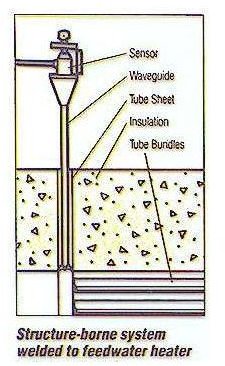Boiler Tube Leakage detection by Acoustic Instrument in Thermal Power Plant
Introduction - Boiler Tube Leakage
Boiler tube leakage is the major cause of outage of units and generation loss in thermal power plants. Detection of boiler tube leakage is a very important factor for power plant functioning as approximately 60% of boiler outages are due to tube leaks. Power plant engineers must remain vigilant about boiler tube leaks so that secondary damage to pressure parts such as water wall tubes and headers, super heater tubes, reheater tubes, and furnace refractory may be avoided. Boiler tube leaks have even been known to lead to bending damage and deformation of the entire boiler. The costs of repair, replacement, and maintenance due to secondary damage can be very high.
Outages cause inconveniences and possible loss of income for normal consumers in the course of their day-to-day work. Acoustic monitoring instruments that detect boiler leaks are directly related to the solution for power outages and the suffering of common consumers.
Acoustic Monitoring and Traditional Methods of Detecting Boiler Tube Leaks
Acoustic monitoring is little known outside the power industry. Even some engineers consider it redundant high technology and are not ready to consider it because of concerns of the costs involved.
For detecting boiler tube leaks, plant operating engineers constantly monitor boiler furnace vacuum, which is maintained between a -10 to -20 mm water column, feed water flow to the boiler drum from the feed pump, which must not abruptly increase, the de-aerator level, the quantity of makeup water, and hissing sounds emitted by leaking steam detected by human ears at the boiler floor physically.
Boiler furnace vacuum generally gets disturbed and starts fluctuating if a sufficient amount of steam leakage occurs. There are also increases in feed water consumption, which is monitored by feed flow instruments provided in the unit control board. The de-aerator level and make up water to the hot well is also monitored by instruments provided at the UCB. Boiler tube leaks must be detected very early, otherwise leaking steam may further damage adjacent costly parts due to its heavy impact.
Units allowed, through negligence, to run for a long time without maintenance results in great loss to the boiler such as costly water wall tubes and headers, superheaters, furnace refractory, and even boiler structure beams which share boiler loads have had to be replaced due to damage or bending. Structural beams at the top share full load, so leaking steam can cause bending and deformation there as well.
The furnace refractory is like a protective layer. When leaking steam strikes refractory, it becomes damaged, too.
Maintenance costs due to secondary damage from boiler tube leaks are very high, and repairing the damage takes a very long time.
Traditional leak detection systems, such as hearing hissing noises or detecting vacuum fluctuations, are not reliable or sensitive enough to detect small tube leaks in the early stages. These conventional methods may detect a tube leak- if it’s big enough- and getting big enough could take as much as 72 hours! There are many instances in which thermal power plants have been allowed to run for extended times with undetected tube leaks due to confusion in the absence of advanced monitoring systems.
Acoustic monitoring leak detection systems use sensors and microphones to detect high frequency noises emitted from leaking boiler tubes and piezoelectric sensors mounted on the boiler structure to transform these waves into electronic voltage, which are amplified, filtered, and processed to indicate the boiler leakage amount and its exact location online by a DCS, or distributed control system. Unused soot blower ports may be utilized for its erection. Online monitoring is also done, so both software and hardware are provided with this advanced system.
Acoustic monitoring and detection systems for boiler tubes are very much cost effective because the early detection results in substantial reductions in repair times and costs with a consequent increase in power plant load factor. The early detection of a boiler tube leak will give financial savings which will easily exceed the initial capital cost of the advanced detection system in few months.
Image: Acoustic Monitoring for Boiler Tube Leak Detection
References
https://www.acousticmonitoring.com/
Liquid or gas leaks emit high frequency acoustic sound waves which are detected with this advanced technology.
https://www.proconeng.com/mainfiles/boilerleak.html
An increase in boiler availability of just one day will more than cover the cost of a leak detection system.
https://www.triple5industries.com/
Acoustic leak detection systems used to find leaks in pressurized vessels including power boilers, recovery boilers and feedwater heaters.
